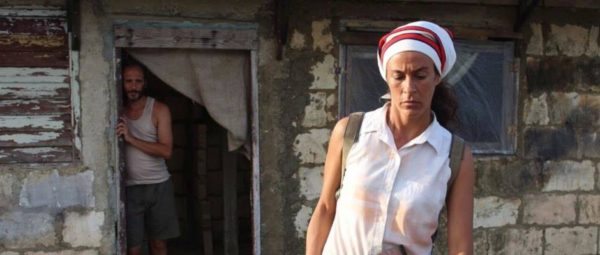Film Review; “Santa and Andres”

Cuban filmmaker Carlos Lechuga’s second feature film Santa and Andrés is a heart-breaking compelling tale set in a remote part of Cuba at the beginning of the 1980’s. Andrés (Eduardo Martinez) is an openly-gay subversive writer who has been exiled to his hillside hovel of a shack and forbidden to write anything more against the governing revolutionary Party. When there is to be another International Peace Forum in a nearby town, Santa (Lola Amores) a local peasant woman is sent to sit outside his house for three days to ensure he doesn’t leave to go and disrupt the proceedings.
‘Prisoner’ and ‘Guard’ make an odd couple, and initially are very hostile to each particularly as Santa is a loyal member of the party, but when she discovers from the local leader Jesus (George Abreu) that their one-off fling is going nowhere, her attitude towards Andrés starts to change.
He meanwhile has been busy at night-time surreptitiously scribbling away on yet another new book that he secretes in the outside latrine. He has also been having nighttime visits from a young mute man (Cesar Domínguez) who hustles what little he can off Andrés after they have sex. When Santa comes across him early one morning Andrés tries to pass him off as his nephew, but on her return visit when she finds Andrés all beaten up and in need of hospitalization, she knows this isn’t true at all.
Santa and Andrés are a pair of loners who have both suffered under the repressive regime, although she would never admit it. Their loneliness brings them closer together, and even though it is not on the intimate footing that Santa desperately wants, she becomes close enough to him to abandon her party loyalty when suddenly he is in deep trouble again with the Authorities again.
Martinez is nothing less than excellent as Andrés who has to deal with the reality that he is a double victim of this aggressive regime being both gay and counter-revolutionary. Even the fact that he has all but being robbed of his life and lives in constant fear, he still displays the spirit of man who is determined to find a way to be true to himself on every level. Amores, in her first movie acting role, is quite wonderful as this docile loyal party member who once she discards her uniform and dons a pretty dress, and lets her hair down, starts to realize the possibility of actually finding some companionship to make her happy.
Lechuga tells the tale beautifully letting his two protagonists gradually blossom in their roles as the story unwinds. The inclusion of so much wonderful Cuban music on the soundtrack is a big plus too.
If you are under any illusion that this story is dated and such a situation could not possible take place under the present regime, just note that everything has not evolved that much in present-day Cuba. The film was actually recently banned from the 38th Edition of the Havana Film Festival for ‘political reasons’. It is however deservedly being shown to audiences elsewhere, notably at the Miami Film Festival next month.